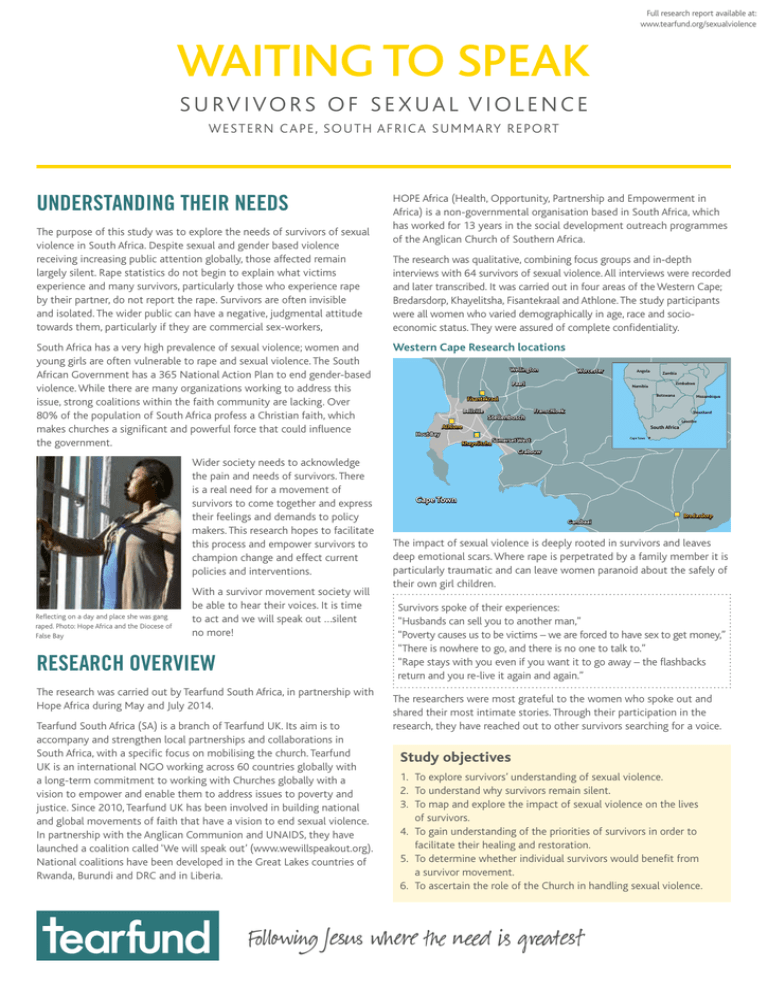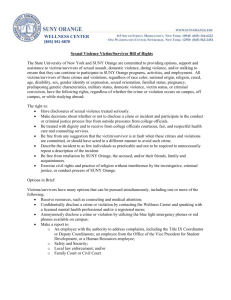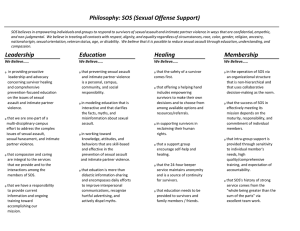
Full research report available at:
www.tearfund.org/sexualviolence
WAITING TO SPEAK
S U RV I V O R S O F S E X UA L V I O L E N C E
WESTERN C APE, SOUTH AFRIC A SUMMARY REPORT
UNDERSTANDING THEIR NEEDS
The purpose of this study was to explore the needs of survivors of sexual
violence in South Africa. Despite sexual and gender based violence
receiving increasing public attention globally, those affected remain
largely silent. Rape statistics do not begin to explain what victims
experience and many survivors, particularly those who experience rape
by their partner, do not report the rape. Survivors are often invisible
and isolated. The wider public can have a negative, judgmental attitude
towards them, particularly if they are commercial sex-workers,
South Africa has a very high prevalence of sexual violence; women and
young girls are often vulnerable to rape and sexual violence. The South
African Government has a 365 National Action Plan to end gender-based
violence. While there are many organizations working to address this
issue, strong coalitions within the faith community are lacking. Over
80% of the population of South Africa profess a Christian faith, which
makes churches a significant and powerful force that could influence
the government.
HOPE Africa (Health, Opportunity, Partnership and Empowerment in
Africa) is a non-governmental organisation based in South Africa, which
has worked for 13 years in the social development outreach programmes
of the Anglican Church of Southern Africa.
The research was qualitative, combining focus groups and in-depth
interviews with 64 survivors of sexual violence. All interviews were recorded
and later transcribed. It was carried out in four areas of the Western Cape;
Bredarsdorp, Khayelitsha, Fisantekraal and Athlone. The study participants
were all women who varied demographically in age, race and socioeconomic status. They were assured of complete confidentiality.
Western Cape Research locations
Wellington
Worcester
Paarl
Angola
Stellenbosch
Franschloek
Mozambique
Swaziland
Lesotho
Athlone
South Africa
Hout Bay
Khayelitsha
Zimbabwe
Botswana
Fisantekraal
Bellville
Zambia
Namibia
Cape Town
Somerset West
Grabouw
Wider society needs to acknowledge
the pain and needs of survivors. There
is a real need for a movement of
survivors to come together and express
their feelings and demands to policy
makers. This research hopes to facilitate
this process and empower survivors to
champion change and effect current
policies and interventions.
Reflecting on a day and place she was gang
raped. Photo: Hope Africa and the Diocese of
False Bay
With a survivor movement society will
be able to hear their voices. It is time
to act and we will speak out …silent
no more!
RESEARCH OVERVIEW
The research was carried out by Tearfund South Africa, in partnership with
Hope Africa during May and July 2014.
Tearfund South Africa (SA) is a branch of Tearfund UK. Its aim is to
accompany and strengthen local partnerships and collaborations in
South Africa, with a specific focus on mobilising the church. Tearfund
UK is an international NGO working across 60 countries globally with
a long-term commitment to working with Churches globally with a
vision to empower and enable them to address issues to poverty and
justice. Since 2010, Tearfund UK has been involved in building national
and global movements of faith that have a vision to end sexual violence.
In partnership with the Anglican Communion and UNAIDS, they have
launched a coalition called ‘We will speak out’ (www.wewillspeakout.org).
National coalitions have been developed in the Great Lakes countries of
Rwanda, Burundi and DRC and in Liberia.
Cape Town
Gansbaai
Bredasdorp
The impact of sexual violence is deeply rooted in survivors and leaves
deep emotional scars. Where rape is perpetrated by a family member it is
particularly traumatic and can leave women paranoid about the safely of
their own girl children.
Survivors spoke of their experiences:
“Husbands can sell you to another man,”
“Poverty causes us to be victims – we are forced to have sex to get money,”
“There is nowhere to go, and there is no one to talk to.”
“Rape stays with you even if you want it to go away – the flashbacks
return and you re-live it again and again.”
The researchers were most grateful to the women who spoke out and
shared their most intimate stories. Through their participation in the
research, they have reached out to other survivors searching for a voice.
Study objectives
1. To explore survivors’ understanding of sexual violence.
2. To understand why survivors remain silent.
3.To map and explore the impact of sexual violence on the lives
of survivors.
4.To gain understanding of the priorities of survivors in order to
facilitate their healing and restoration.
5.To determine whether individual survivors would benefit from
a survivor movement.
6. To ascertain the role of the Church in handling sexual violence.
Following Jesus where the need is greatest
Research information gathering meeting ends in group prayer. Photo: Hope Africa and the Diocese of False Bay
SUMMARY OF KEY FINDINGS
The research unearthed hidden root causes about why women stay silent
in abusive relationships without seeking justice. It shows the need for
women to reach-out to others as survivors, and to speak out against the
exploitation and violence inflicted on women for no reason.
Understanding of sexual violence
Survivors’ understanding of sexual violence was far wider than that of rape.
Their experiences were sobering and included the use of force, personal
violation, a troubling inter-generational cycle of rape, brutality, transactional
sex, alcohol abuse, poverty, domestic violence and a loss of control.
Another long term consequence is the impact on young children of
observing domestic violence. Young boys might model their father’s
aggressive treatment towards their mother, continuing the cycle of abuse.
Gaining healing from sexual violence
A prominent theme among survivors was their desire for support; to feel
loved, to share their stories and to support others. Other expressed needs
were to access professional and legal assistance.
“Abuse kills us inside”
There is a need for victim support centres and specialised sexual crime
units at police stations, designated medical doctors for sexual trauma
cases and court practitioners to assist with navigating the court system.
Silence in the face of overwhelming suffering
Developing a survivor-led movement
Most participants knew their perpetrators – who raped them repeatedly.
The perpetrators made the victim fear that if she broke the silence, they
would kill her or her children. Survivors remain silent because they feel
threatened and afraid.
All participants agreed that the formation of a survivor-led movement
would bring many benefits. Such a movement would help bring healing,
foster solidarity and break the silence. Survivors could access a support
group and build a circle of trust with other survivors.
In addition to the threat of physical reprisals, survivors also fear social
stigma and judgement, and lack protection from legal or social support
systems. They may blame themselves or they may stay silent in order
to protect their families. In addition survivors mentioned their financial
dependency on family members.
These benefits would begin to restore confidence to survivors and
provide a way of reducing their vulnerability to repeated sexual violence.
Survivors felt that because they could see no way out, they needed to
endure the pain both for the sake of their children and because marriage
is regarded as binding culturally.
The impact of sexual violence on victims
The impact of sexual violence was wide ranging. It could result in a lack
of self-confidence, shame, lack of trust and unwanted pregnancies. For
some victims the trauma has affected them physically, giving rise to a
wide variety of illnesses, while others noticed changes in their character.
Depression and suicide as well as long term effects on interpersonal
relationships were also common.
The challenge to the church
‘And will not God bring about justice for his chosen ones, who cry out to
him day and night? Will he keep putting them off? 8 I tell you, he will see
that they get justice, and quickly.’
Luke 18: 7-8a
The study established that the church in South Africa is ill-equipped to
deal with sexual violence. Participants did not feel that churches were
places where they felt free to be themselves and share their real life
experiences of sexual violence due to fear of gossip, stigma, judgmental
attitude and ostracism. Sadly several participants shared stories of sexual
violence from church officials. These views pose a serious challenge to
the relevance of the church in dealing with sexual violence.
“My 9 year old daughter was raped in the church when she was hungry
and went to the soup kitchen.”
KEY RECOMMENDATIONS
Survivors of sexual violence are waiting to speak out. Their voices carry
strength and the hope they might overcome their situations. Once
society acknowledges their pain, then judgment would no longer be
a pervading fear. Advocating for change in government policy would
enhance the response to survivors needs. The formation of survivor-led
forums could help survivors overcome their trauma, encourage more
survivors to speak out and would enable restoration and healing to begin.
Survivor movement
A survivor movement should be led by a survivor or survivors and reach
out to all those suffering in silence. Their united voices could be heard
within a safe forum, not hidden behind alarming statistics.
Among the key services offered should be group therapy facilitated
by survivors, supportive systems in reporting sexual violence to the
authorities and skills training (to equip women so they are no longer
unemployed and dependent on their partners.
Advocacy for policy change
The findings suggest a gap between policy making and the
implementation of those policies in communities. Those who put
policies in place do not communicate directly with the people who are
beneficiaries of these policies. This poses a critical short-coming in South
Africa’s legal system and the implementation of existing laws dealing
with sexual violence. There is also a need for policy change which a
survivor movement could help catalyse.
A survivor movement can allow the survivors voices to be clearly heard;
promoting advocacy to protect the rights of victims.
Education and awareness around sexual violence
There is a need for considerable education and awareness-raising around
gender issues and sexual violence. People need to understand the
different kinds of abuse and how to go about reporting it. When people
are not satisfied with the treatment or service they receive, again they
need to know how to report this and ensure that justice is done.
The failure of response from the legal and social support systems adds to
the disempowerment of survivors.
A survivor movement would allow women a safe forum to speak out. Photo: Hope Africa and the Diocese of
False Bay
Role of the church
Survivors need help to find healing. A key part of healing is enabling
survivors to accept the love of God and to forgive themselves as well
as the perpetrator. The church should be a house of healing and peace
where there is no fear of judgement. It is also called to be the voice of
the voiceless.
Church leaders need to be equipped with biblical teaching and
interpretation, with awareness of how best to support victims of sexual
violence and with the necessary information for them to do appropriate
referrals and counselling.
On a practical level churches could provide a space for support groups to
meet and could also provide parental skills workshops. Churches could
have a positive role in developing awareness around gender issues and
sexual violence.
Men from the church and community speaking out against gender based violence. Photo: Hope Africa and the Diocese of False Bay
Tearfund is a Christian relief and development agency building a global
network of local churches to help eradicate poverty.
Tearfund has 10 years’ experience working through church-based
partners in the response to sexual violence.
Tearfund is a founding member of We Will Speak Out,
a coalition of faith-based groups, international aid
agencies and individuals committed to see the end
of SV in communities worldwide.
www.wewillspeakout.org
Tearfund would like to acknowledge:
-The HOPE Africa team (Mari Lotvonen, Petrina Pakoe, Thabiso Nyapisi & Thandeka
Mashwama) who helped facilitate this research.
- The Anglican Diocese of False Bay who helped to coordinate the research studies.
Tearfund contact: Veena O’Sullivan, HIV & SV Unit
Email: veena.osullivan@tearfund.org
Editor: Isabel Carter
This summary report is based on research commissioned by Tearfund
and conducted by Bongi Zengele.
For the full report visit www.tearfund.org/sexualviolence
All names have been changed in order to protect the research participants.
Designed by Blue Mango Creative
© Tearfund September 2014
Following Jesus where the need is greatest
www.tearfund.org
100 Church Road, Teddington TW11 8QE
Challenge House, 29 Canal Street, Glasgow G4 0AD
Tŷ Catherine, Capel Cildwrn, Llangefni, Ynys Môn LL77 7NN
241 Newtownards Road, Belfast BT4 1AF
enquiries@tearfund.org 0845 355 8355
Registered Charity No. 265464 (England and Wales)
Registered Charity No. SC037624 (Scotland)
31294-(0914)





